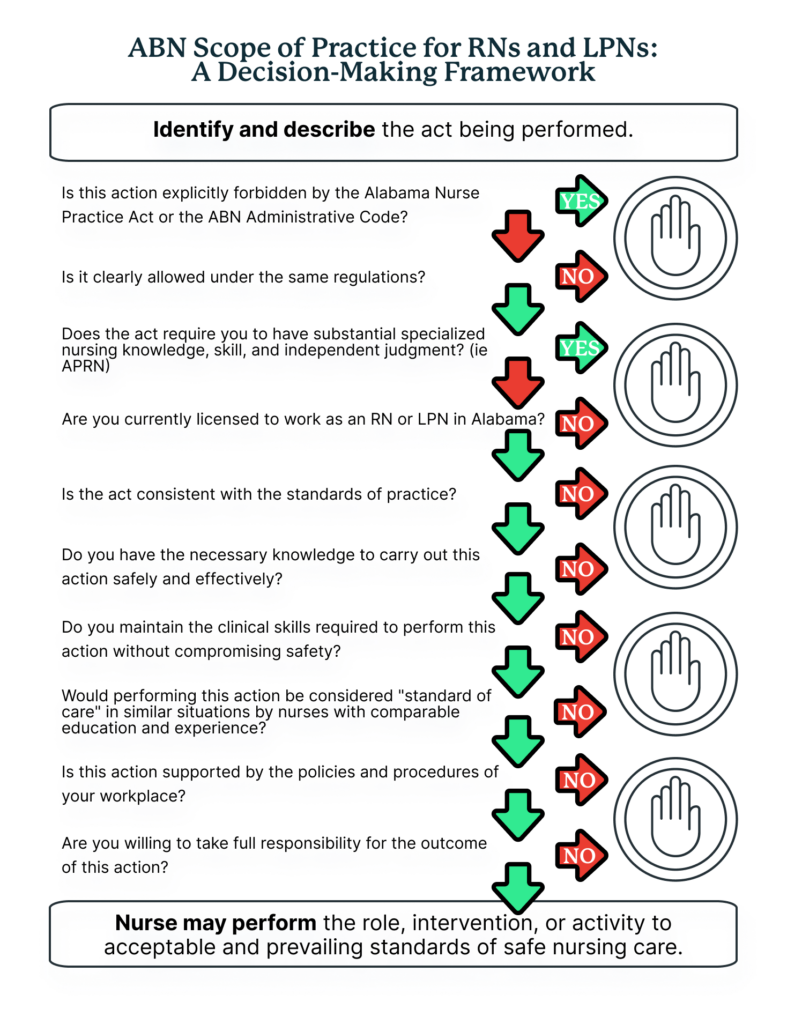They wanted to make sure anyone dreaming of becoming a nurse was properly schooled and ready to take on the world while keeping a tight grip on the rules of nursing through the Nurse Practice Act and the ABN Administrative Code.
The 13 members of the Board craft regulations that cover everything nursing-related—how nurses do their job, how they learn, how they obtain licenses, and what the disciplinary measures are. These rules are packed in Title 610 of the Alabama Administrative Code.
Fast forward to today, and Alabama oversees over 97,000 nurses.
| License Type | Count |
| Registered Nurses | 83128 |
| Licensed Practical Nurses | 13728 |
| CRNPs | 8631 |
| CNMs | 41 |
| Active CRNAs | 1955 |
| Active CNSs | 53 |
| Medication Assistants, Certified (MACs) | 1203 |
| Student Nurse Apprentices (SNAs) | 434 |
But the ABN isn’t just about laying down the law. They’ve set up Advisory Councils to make sure they’re always getting the scoop from the nursing and healthcare peeps. This way, they make decisions that really make a difference in how care is given.
ABN is collaborating with prominent organizations such as the National Council of State Boards of Nursing (NCSBN), the Federal Association of Regulatory Boards (FARB), the Council on Licensure, Enforcement, and Regulation (CLEAR), and the Alabama Rural Health Association. By joining these clubs, ABN members and their associates can access the most current information and best practices. This means they’re always a step ahead, ready to tweak and improve how nurses are taught, how they practice, how they’re regulated, and how they get their licenses,
Alabama State Board Of Nursing Contacts
| Alabama Board of Nursing Email | [email protected] |
| Al Nursing Board Phone Number | 1-800-656-5318 |
| State Of Alabama Nursing Board Address | RSA Plaza, Suite 250770 Washington Ave.Montgomery, AL 36104 |
| Alabama State Board Of Nursing Portal | https://www.abn.alabama.gov/ |
State Of Alabama Nursing Board Application Process
To practice nursing in Alabama you’ll need an active, legit license, either from Alabama or another state that’s part of the National Licensure Compact (NLC). Getting that initial license means passing the National Council Licensure Examination (NCLEX) for LPNs or RNs, or getting an endorsement if you’re already licensed in another state but want to set up in Alabama.
The ABN also rolls out permits for those ace Medication Assistants and certifies top-notch applicants. Thanks to Alabama Act No. 2021-275, the ABN kicked off a game-changing move on March 17, 2022, by letting Student Nurse Apprentices jump into the action.
Al Board Of Nursing Single-State and Multistate Licensure
In Alabama, if you’re aiming to nurse solely within its borders, you’ll be applying for what’s known as a single-state license (SSL). This is perfect for those who plan to work exclusively in Alabama. But if you’re moving to Alabama and already have an active multistate license from another state, you’ll need to switch gears and not maintain that multistate status elsewhere.
For nurses who like to keep their options open, Alabama offers multistate licenses (MSL). This choice is for those who call Alabama home (your primary state of residence or PSOR) and want the flexibility to practice in any Nurse Licensure Compact (NLC) state. With an MSL, you’re free to work across state lines but remember—you’re always under the umbrella of the local laws wherever you’re currently working.
Now, for the advanced practice registered nurses (APRNs) out there holding a multistate RN license from another state but not planning to switch your home base to Alabama, you’ll still need to get the green light from Alabama to practice your advanced skills here.
- If you’ll need to switch from an SSL to an MSL— head over to their site and log into your profile.
- If circumstances lead you to revert your MSL to an SSL, keep in mind that your license will then be up for renewal every year. Plus, the requirement to complete 24 hours of continuing education (CE) doesn’t vanish during this period. When it’s time for your next SSL renewal, you’ll need to have clocked in at least 12 hours of CE for the year ahead.
APRNs, there’s an extra step for you. Along with the standard CE, you’re expected to nab at least six hours in pharmacology CE. And don’t forget, you’ll need to re-up your AP approval come renewal time too.
Cost-wise, flipping your MSL to an SSL breaks down like this: For RNs or LPNs, it’s $103.50 for the Single State License and an additional $75 for AP Approval.
Alabama’s licensing framework is designed with flexibility in mind, whether you’re setting down roots and practicing locally or you’re spreading your wings across state lines. Just remember, each type of license comes with its own set of rules to follow and requirements to meet.

Al Nursing Board Examination Requirements
Let’s dive into the nitty-gritty of getting your nursing license by examination, but remember, you should only apply in one state. Trying to snag Temporary Permits left and right in different places is a no-go.
- Fees: For the application, you’re looking at $125, plus a little extra — $3.50 for the transaction fee.
- Social Security Number (SSN): Without a valid Social Security Number you’re hitting a wall because the application can’t go through without it.
- Citizenship or Legal US Resident: Only US citizens or folks with legal US residency get to play.
- Graduating from a Nursing Program: You need to have finished a nursing program (RN or PN) that’s pretty much on par with what Alabama expects.
- Transcripts: Get your nursing program to send over an official transcript directly to the ABN, and make sure it’s in a sealed envelope. Faxed stuff won’t cut it. The ABN buddies up with eScrip-Safe, Parchment, National Student Clearinghouse, and Credential Solutions for transcript submissions.
- Pearson Vue Registration: Pearson Vue might let you slide by without a middle name or SSN when registering for the NCLEX®, but the ABN wants all the details. Make sure the name on your ID matches up with what you’ve got on your ABN and Pearson Vue records.
If you’re eyeing that multistate licensure in Alabama, most hoops are the same to jump through. But, as we mentioned before, you’ll have to declare Alabama as your primary residence, show proof you live there (ABN Administrative Code 610-X-4), and fill out the Declaration of Primary State of Residence form with all the trimmings.
Your application needs to be complete, which means including the PSOR form, Citizenship Checklist, and all related documents. Don’t forget about getting those fingerprints done after you’ve submitted your application. For this round, the application fee is $225, with the transaction fee still at $3.50.
And a heads-up: get your application into the Board of Nursing before you even think about fingerprinting. Jump the gun and send those fingerprints in early, and you’re out of luck (and a refund).
Alabama Board of Nursing Licensure by Endorsement
If you’re eyeing Alabama Licensure by Endorsement, remember a lot of what you need to do mirrors the initial licensure process we talked about before. Keep those key requirements in mind—like the need for a valid Social Security Number, being a U.S. citizen or legal resident, graduating from a nursing program that meets Alabama’s standards, and ensuring your nursing program transcript is sent through approved channels. But let’s focus on what sets the endorsement path apart.
- Application Fees: When it comes to endorsement, you’re looking at a slightly different fee structure. For a Single State License (SSL), the fee is $125, while a Multistate License (MSL) will cost you $225. Don’t forget about the additional $3.50 transaction fee.
- Continuing Education (CE): You must have racked up twenty-four contact hours of continuing education in the past two years.
- Verification of Licensure: You need to prove your current license’s legitimacy. Request for Verification of Nursing License for Endorsement from your original state sent directly to the ABN. If your state isn’t on the Nursys® list, there’s a specific form you’ll need to use for this process.
- Fingerprinting: Just like in the initial process, your application should already be with the ABN before you think about fingerprinting. Remember, no refunds for jumping the gun here.
Hold off on submitting any supporting documents (like verification, CE, or citizenship documentation) until after your electronic application and payment are complete.
You can keep track of your Alabama Board Of Nursing Application Status. Just hop onto their website and find the Alabama Board Of Nursing Login to peek at your application details and see how things are moving along.
Board Of Nursing Alabama Practice Laws And Regulations
The Alabama Board of Nursing (ABN) stays neutral on how to gauge a nurse’s competency, leaving it up to each facility, nursing supervisor, and nurse to figure out. The laws that guide nursing in Alabama, namely the Alabama Nurse Practice Act and the ABN Administrative Code, are designed to cover nursing across all settings. When deciding what tasks a nurse can handle, there are a few critical points to consider:
- The Nurse’s Education
- Workplace Rules
- ABN’s Detailed Rules: Specifically, Chapter 610-X-6-.12
RNs and LPNs have a big responsibility. They’re in charge of ensuring patients get top-notch care, influenced by their education, proven skills, and experience. They also need to oversee the quality of care provided by others under their watch. This means staying sharp with current tech and practices that align with their workplace’s policies.
Being competent in nursing isn’t just about knowing your stuff. It includes:
- Understanding and following the laws and rules for nursing.
- Keeping up with the standards and procedures of nursing, including those specific to your workplace.
- Always learning and staying skilled in your nursing field.
- Knowing when something’s out of your depth and getting help or advice from other healthcare pros when needed.

The ABN lays out a clear path for nurses wanting to do more than their basic training allows. According to rule 610-X-6-.12, stepping beyond basic duties means having a detailed plan, completing relevant training, getting hands-on experience under supervision, and showing you’ve got the skills, both when you start and as you continue in your role. If there’s ever a question about a nurse’s abilities, their training and competency records could be pulled up for review.
“Standardized procedures” are the written rules that explain what RNs and LPNs can do beyond their initial training. For any new procedures, a facility must get the green light from the ABN, which starts with an application signed by the nursing leader, the top doctor, and the boss of the facility.
Lastly, when we talk about “direct supervision,” it means there’s an experienced nurse physically there, ready to guide, direct, and check in on how things are going, especially important for new nurses working with a temporary permit.
The ABN makes it clear: expanding your nursing practice comes with a set of steps to ensure safety and quality, starting with a solid application process involving the top brass of your workplace.

Alabama Nursing Board Licensing And Certification
Navigating the Alabama Board of Nursing’s (ABN) licensing and certification process can feel like decoding a complex puzzle, but let’s break it down into digestible pieces, focusing on what’s unique and specific to each category while skipping over the common ground we’ve covered.
MAC Application Necessities
- Application Fees: A $50 application charge, plus a $3.50 transaction fee.
- Education: ABN-approved MAC education programs
- Transcript Submission: Your program must send your transcript or certificate directly to the ABN. Remember, emails are fine, but faxes are a no-go.
Alabama Advanced Practice Nurses (APN) Pathways
Whether you’re aiming to be a Certified Registered Nurse Practitioner, Certified Nurse Midwife, Certified Registered Nurse Anesthetist, or Clinical Nurse Specialist, the initial steps are familiar—an active Alabama RN license, the right educational degree, and specific certification for your field. Yet, each specialty has its nuances:
CRNP and CNM:
- Electronic Application: A straightforward process. Make sure all the info you punch in is accurate.
- Practice Documents: Prepare to submit signed copies of Standard Protocols and Quality Assurance Plans.
- Physician Commencement: Collaboration can’t begin until the ABN and the Board of Medical Examiners are in sync regarding your commencement form and fee.
CRNA:
This role requires a nod from the National Board of Certification and Recertification for Nurse Anesthetists (NBCRNA). Ensure they send your certification verification directly to the ABN.
CNS:
Your certification from a recognized agency is a crucial piece of the puzzle. Get that verification sent over to the ABN electronically.
Each role within the nursing sphere in Alabama has its tailored checklist, but the essence of the application process—precision, authenticity, and adherence to ABN standards—remains constant.
Alabama Nurse Licensure Compact (NLC)
The Nurse Licensure Compact (NLC) lets RNs and LPNs zip across state lines, helping folks face-to-face or through telehealth in all the NLC member states. To obtain a license within a state like Alabama, which is all in on the eNLC, you will need to meet the uniform licensure requirements:
- Make sure you’re up to snuff according to your home state’s rules.
- Board-approved program or an international one that’s got the green light from its accrediting body (and checked over by a credentials crew).
- Proficiency in English
- Passing the NCLEX-RN® or NCLEX-PN®
- A clean, active license.
- Background fingerprint checks at both state and federal levels.
- No felony offenses or nursing-related misdemeanors.
- A valid U.S. Social Security number is non-negotiable.
To make Alabama your primary state of residence—complete an endorsement application. If you’re already part of the Alabama nursing family and want to go multistate, just fill out the right form, and make sure you meet all the criteria listed above.
ABN APRN Compact
Now, for the APRNs in the crowd, while the NLC doesn’t cover you directly, it still touches on your practice. An Alabama Multistate license (MSL) is your best bet to live and work in multiple states. And if you’re an APRN cruising into Alabama from another compact state, you can skip the Alabama RN license but not the ABN’s advanced practice approval.
The Alabama Board of Nursing (ABN) isn’t just stopping there. They’re all about breaking down barriers to healthcare, especially for the folks living out in the sticks. They’re eyeballing a new plan, the APRN Compact, which would let advanced practice nurses strut their stuff across any member state without getting tangled in red tape. This could be a game-changer for Alabama, making it easier to keep APRNs around when they’re needed most.

Alabama Board Nursing License Renewal
To Renew the Alabama Board Of Nursing License you must stick to a timeframe, it starts on September 1st and wraps up on December 31st. If you’re an RN or APRN, mark your calendar for even years, while LPNs should note the odd years for their renewal time.
When it’s time to renew, every nurse faces a set of important questions about any legal or disciplinary adventures they might have had. Don’t sweat it if you have to check “yes” for any of them. It’s not an automatic no-go for your renewal, but it does mean the Alabama Board of Nursing team will take a closer look, which could stretch out the process a bit.
Let’s talk about the costs:
- For RNs or LPNs holding a Single State License, you’re looking at $103.50 in total ($100 for the license itself plus a $3.50 transaction fee).
- If you’re sporting an RN or LPN Multistate License, the total jumps to $203.50 ($200 for the license and the same $3.50 transaction fee).
- APRNs, you’re in for $78.50 each time you renew ($75 for the license fee with that ever-present $3.50 transaction fee).
Alabama Board Of Nursing License Renewal is key to continuing your essential work without a hitch.
Alabama State Nursing Board Continuing Education (CEU)
The Alabama Board of Nursing (ABN) gives its seal of approval to both Practical Nursing (PN) and Registered Nursing (RN) programs, making sure these programs hit the educational mark. To keep everything on the up and up, the ABN does check-ins now and then with surveys to see that these standards stay sky-high.
Alabama Board Of Nursing CEU requirements are as follows, 24 hours of continuing education credits every license period. For the Advanced Practice Nurses (APNs) 6 hours need to be in Pharmacology.
For the new kids on the block, whether you got your license through passing the NCLEX exam or by endorsement, there’s a must-do: 4 contact hours of Board-provided CE. It’s a deep dive into the workings of the Board, the Nurse Practice Act, the rules of the road for nursing, and what it means to be a professional, accountable nurse.
Alabama Board Of Nursing Approved CEU Providers
The ABN isn’t handing out approvals to just anyone. To get their thumbs-up, providers—whether they’re individuals, partnerships, educational powerhouses, governmental bodies, or healthcare facilities (think hospitals, nursing homes, and the like)—need to show they’ve got what it takes to offer stellar continuing education for nurses.
There are also national or regional agencies, journals, Alabama regulatory agencies or boards, and other Nursing Boards that get a nod from the ABN. They’re recognized because they offer or approve CE that meets the mark, sticking closely to the high standards the ABN expects for its approved providers.

Complaints And Disciplinary Actions
The Alabama Board of Nursing (ABN) is tasked by state lawmakers with the hefty role of upholding the high standards of nursing practice and education. For a deep dive into how they handle issues, peek at Chapter 610-X-8 of the ABN Administrative Code, focusing on Disciplinary Action.
When a complaint comes in suggesting a nurse stepped out of line with the Nurse Practice Act (NPA), the ABN kicks into high gear, ensuring the process is square and fair. Nurses might face one of four disciplinary outcomes: Public Reprimand, Probation, Suspension, or Revocation. It’s crucial to know these marks stay with your license forever. But, whisper it, investigations themselves don’t make the public bulletin board.
If you find yourself under the microscope, you’ll need to fess up when renewing your license or eyeing new job opportunities, not just in Alabama but elsewhere too.
Getting to the heart of the matter requires a board meeting. Nurses might see their case resolved with a nod through a Consent Order or might have to gear up for an Administrative Hearing, with a heads-up given in advance, all by the book.
If your license is in a tight spot with Probation or Suspension, you can kiss goodbye to Compact licensure dreams for now. And if you’re already part of the Compact crew but hit a bump, expect to revert to a single-state license until the coast is clear.
So, what lights the fuse for an investigation? It could be a written complaint from almost anyone—employers, the folks in blue, patients, or their kin. Once the ABN gets wind of it, they let the nurse know it’s game time for a closer look.
Nurses aren’t left to walk this tightrope alone; lawyering up is an option. But don’t expect the ABN to dial up a lawyer for you; they’re running the investigation, not defending your corner.
Even in the thick of it, nurses can keep their licenses active, keep working, or hunt for jobs. Diving into an investigation, the ABN’s sleuths cast a wide net—checking courts, nursing databases, and even your digital footprint. They’ll ask for specifics, and this first chat is just one chance to clear the air with your side of the story.
The ABN aims to wrap up these probes within six months, but real life—like elusive witnesses or dragging heels—can stretch that timeline.
At the finish line, a board lawyer weighs the evidence. If the complaint doesn’t hold up, it’s as if it never happened—no public record, no fuss.

Alabama Board Of Nursing License Lookup And Verification
Nurses, their bosses, and anyone else curious can Alabama Board Of Nursing Lookup using NURSYS, a big-time national database that keeps tabs on nurses’ licenses, any disciplinary actions, and work permissions. This system covers RNs and LPN/VNs and is hooked up with nursing boards all over, especially those in the Nurse Licensure Compact gang.
For employers on the hunt for new talent, Nursys QuickConfirm is a neat tool for the interviewing phase. But once you decide to bring a nurse on board, it’s time to level up to Nursys e-Notify. This service lets you double-check the details that make a nurse unique, ensuring you’ve got the real deal and not an imposter. Quick heads up: Nursys QuickConfirm isn’t the go-to for confirming identity due to the risk of license fraud.
The Alabama Board of Nursing (ABN) also offers its own ABN Subscription Service, aimed at places employing Alabama’s finest nurses. This service keeps you in the loop with real-time updates on any changes to your nurse employees’ license status, helping you steer clear of the sticky situation of having someone on the team without the ABN’s thumbs up.
When you need Alabama Board Of Nursing License Verification, the ABN License Lookup Tool is your friend, giving you the scoop straight from the source as of the verification print date. Just remember, this isn’t the same as the full-blown verification other nursing boards might want before they say yes to a new license. You can do a quick search by name or license number.
Alabama Board of Nursing Useful Online Resources
FAQs about the Alabama Board of Nursing
-
What is the Alabama Board of Nursing?
The Alabama Board of Nursing is the regulatory authority established to oversee the practice of nursing within the state of Alabama. The Board plays a critical role in ensuring the health and safety of the public through the regulation of Registered Nurses (RNs), Licensed Practical Nurses (LPNs), and Advanced Practice Registered Nurses (APRNs). -
What is the purpose of the Alabama Board Of Nursing?
The primary purpose of the Alabama Board of Nursing is to protect public health, safety, and welfare through the regulation of the nursing profession. This includes licensing nurses, approving nursing education programs, establishing standards for nursing practice, and taking disciplinary action against licensees who have violated nursing laws or the Board’s regulations. -
Who are the members of the Alabama Board of Nursing?
The 13 members of the Alabama Board of Nursing are appointed by the Governor and typically include Registered Nurses (RNs), Licensed Practical Nurses (LPNs), and members of the public. -
Does Alabama State University have a nursing program?
Yes, Alabama State University offers a nursing program through its College of Health Sciences. Accredited by relevant nursing education bodies, Alabama State University’s nursing program offers various degrees, including Bachelor of Science in Nursing (BSN), Master of Science in Nursing (MSN), and post-graduate certificates for specialized nursing fields. -
Does the Alabama Board of Nursing use CE Broker?
The Alabama Board of Nursing had adopted CE Broker, a comprehensive continuing education management system, to simplify the tracking and reporting of Continuing Education (CE) credits for nurses. Nurses registered in Alabama can use CE Broker to report their CE activities, ensuring compliance with the Board’s continuing education requirements for license renewal. -
How much for the Alabama Board of Nursing RN license renewal?
The renewal fee for an RN or LPN Single-State License is $103.50, for a Multistate License— $203.50. APRNs will have to pay $78.50. -
How often does the Alabama Board Of Nursing update?
The Alabama Board of Nursing regularly updates its policies, procedures, and information to reflect changes in legislation, nursing practice standards, and public health needs. -
How to report CEU to the Alabama Board Of Nursing?
To report Continuing Education Units (CEUs) to the Alabama Board of Nursing, nurses can use the CE Broker system, where they can log in, enter their CEU activities, and submit them for approval. The process involves entering details of the CE activities, including the course title, provider, completion date, and credit hours. -
How to self-report to the Alabama Board Of Nursing?
Self-reporting to the Alabama Board of Nursing typically involves reporting any potential violations of nursing standards or changes in personal information that could affect licensure status. This can be done through the Board’s official website, where there are forms and instructions for self-reporting.



